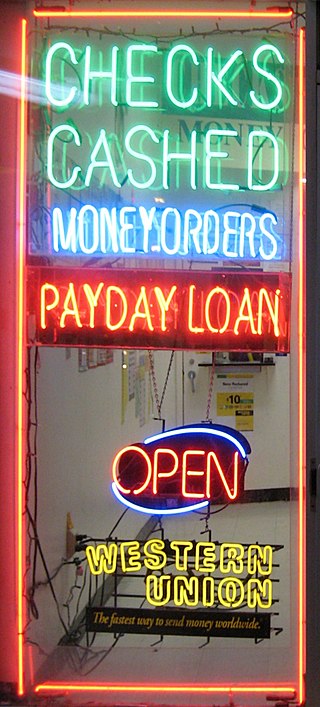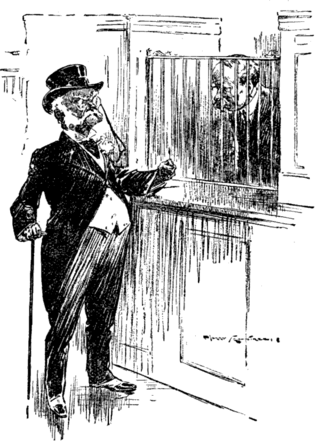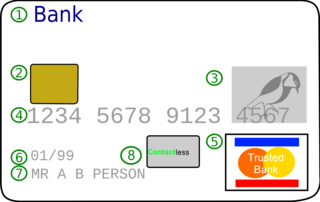Related Research Articles
The Federal Trade Commission Act of 1914 is a United States federal law which established the Federal Trade Commission. The Act was signed into law by US President Woodrow Wilson in 1914 and outlaws unfair methods of competition and unfair acts or practices that affect commerce.
A transaction account, also called a checking account, chequing account, current account, demand deposit account, or share draft account at credit unions, is a deposit account or bank account held at a bank or other financial institution. It is available to the account owner "on demand" and is available for frequent and immediate access by the account owner or to others as the account owner may direct. Access may be in a variety of ways, such as cash withdrawals, use of debit cards, cheques (checks) and electronic transfer. In economic terms, the funds held in a transaction account are regarded as liquid funds. In accounting terms, they are considered as cash.

A payday loan is a short-term unsecured loan, often characterized by high interest rates.
Predatory lending refers to unethical practices conducted by lending organizations during a loan origination process that are unfair, deceptive, or fraudulent. While there are no internationally agreed legal definitions for predatory lending, a 2006 audit report from the office of inspector general of the US Federal Deposit Insurance Corporation (FDIC) broadly defines predatory lending as "imposing unfair and abusive loan terms on borrowers", though "unfair" and "abusive" were not specifically defined. Though there are laws against some of the specific practices commonly identified as predatory, various federal agencies use the phrase as a catch-all term for many specific illegal activities in the loan industry. Predatory lending should not be confused with predatory mortgage servicing which is mortgage practices described by critics as unfair, deceptive, or fraudulent practices during the loan or mortgage servicing process, post loan origination.

The Truth in Lending Act (TILA) of 1968 is a United States federal law designed to promote the informed use of consumer credit, by requiring disclosures about its terms and cost to standardize the manner in which costs associated with borrowing are calculated and disclosed.

Credit card interest is a way in which credit card issuers generate revenue. A card issuer is a bank or credit union that gives a consumer a card or account number that can be used with various payees to make payments and borrow money from the bank simultaneously. The bank pays the payee and then charges the cardholder interest over the time the money remains borrowed. Banks suffer losses when cardholders do not pay back the borrowed money as agreed. As a result, optimal calculation of interest based on any information they have about the cardholder's credit risk is key to a card issuer's profitability. Before determining what interest rate to offer, banks typically check national, and international, credit bureau reports to identify the borrowing history of the card holder applicant with other banks and conduct detailed interviews and documentation of the applicant's finances.

An overdraft occurs when something is withdrawn in excess of what is in a current account. For financial systems, this can be funds in a bank account. For water resources, it can be groundwater in an aquifer. In these situations the account is said to be "overdrawn". In the economic system, if there is a prior agreement with the account provider for an overdraft, and the amount overdrawn is within the authorized overdraft limit, then interest is normally charged at the agreed rate. If the negative balance exceeds the agreed terms, then additional fees may be charged and higher interest rates may apply.

The Electronic Fund Transfer Act was passed by the U.S. Congress in 1978 and signed by President Jimmy Carter, to establish the rights and liabilities of consumers as well as the responsibilities of all participants in electronic funds transfer activities.
A debt buyer is a company, sometimes a collection agency, a private debt collection law firm, or a private investor, that purchases delinquent or charged-off debts from a creditor or lender for a percentage of the face value of the debt based on the potential collectibility of the accounts. The debt buyer can then collect on its own, utilize the services of a third-party collection agency, repackage and resell portions of the purchased portfolio, or use any combination of these options.

Interchange fee is a term used in the payment card industry to describe a fee paid between banks for the acceptance of card-based transactions. Usually for sales/services transactions it is a fee that a merchant's bank pays a customer's bank.

A credit card is a payment card issued to users (cardholders) to enable the cardholder to pay a merchant for goods and services based on the cardholder's accrued debt. The card issuer creates a revolving account and grants a line of credit to the cardholder, from which the cardholder can borrow money for payment to a merchant or as a cash advance. There are two credit card groups: consumer credit cards and business credit cards. Most cards are plastic, but some are metal cards, and a few gemstone-encrusted metal cards.

Office of Fair Trading v Abbey National plc and Others[2009] UKSC 6is a judicial decision of the United Kingdom Supreme Court relating to bank charges in the United Kingdom, with reference to the situation where a bank account holder goes into unplanned overdraft.
Consumer protection is the practice of safeguarding buyers of goods and services, and the public, against unfair practices in the marketplace. Consumer protection measures are often established by law. Such laws are intended to prevent businesses from engaging in fraud or specified unfair practices in order to gain an advantage over competitors or to mislead consumers. They may also provide additional protection for the general public which may be impacted by a product even when they are not the direct purchaser or consumer of that product. For example, government regulations may require businesses to disclose detailed information about their products—particularly in areas where public health or safety is an issue, such as with food or automobiles.
Bank regulation in the United States is highly fragmented compared with other G10 countries, where most countries have only one bank regulator. In the U.S., banking is regulated at both the federal and state level. Depending on the type of charter a banking organization has and on its organizational structure, it may be subject to numerous federal and state banking regulations. Apart from the bank regulatory agencies the U.S. maintains separate securities, commodities, and insurance regulatory agencies at the federal and state level, unlike Japan and the United Kingdom. Bank examiners are generally employed to supervise banks and to ensure compliance with regulations.

The Credit Card Accountability Responsibility and Disclosure (CARD) Act of 2009 is a federal statute passed by the United States Congress and signed by U.S. President Barack Obama on May 22, 2009. It is a comprehensive credit card reform legislation that aims "to establish fair and transparent practices relating to the extension of credit under an open end consumer credit plan, and for other purposes." The bill was passed with bipartisan support by both the House of Representatives and the Senate.
Consumer Action is a nonprofit, consumer education and advocacy center, serving consumers in the United States. Founded in 1971, the mission of Consumer Action is to help individual consumers assert their rights in the marketplace and to advance pro-consumer industry-wide change for the benefit of all. Consumer Action primarily achieves that mission by providing multi-lingual education, outreach, and advocacy services.
Nessa Feddis is an American attorney and banking industry spokesperson.

A surcharge, also known as checkout fee, is an extra fee charged by a merchant when receiving a payment by cheque, credit card, charge card or debit card which at least covers the cost to the merchant of accepting that means of payment, such as the merchant service fee imposed by a credit card company. Retailers generally incur higher costs when consumers choose to pay by credit card due to higher merchant service fees compared to traditional payment methods such as cash.
Financial CHOICE Act is a bill introduced to the 115th United States Congress in 2017 that would, if enacted, roll back "many of the protections in the landmark Dodd-Frank 2010 federal law, including the "strongest" Wall Street "regulations from the financial crisis. The legislation passed the House 233–186 on June 8, 2017. The 600-page legislation was crafted by Congressman Jeb Hensarling (R-TX), chair of the House Financial Services Committee.

The Federal Consumer Credit Act, is a Swiss federal law that aims to increase the protection of borrowers against overindebtedness. The law covers consumer credits and leasing contracts to natural persons without professional or commercial intention, credit and loyalty cards as well as bank overdrafts.
References
- Unfair or Deceptive Acts or Practices; Proposed Rule, Federal Register, Vol. 73, No. 97 (19 May 2008): 28905. Retrieved 2009-10-02.
